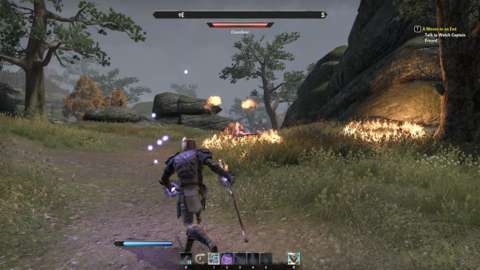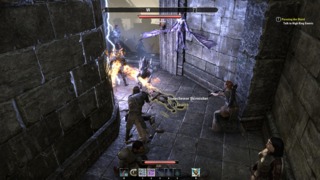The Elder Scrolls Online: Review In Progress
Tribunal.
Depending on who you ask, The Elder Scrolls Online might be a travesty of a role-playing game or the second coming of fantasy adventures. Brendan Caldwell at Rock Paper Shotgun is clearly in the former camp, for instance, while frequent GameSpot contributor Leif Johnson, writing for IGN, is having a grander time, particularly now that he's succumbed to the gift (or is that curse?) of lycanthropy. You might suppose that I would agree with one author more than the other, but the truth is that I reside in both camps at once, sometimes getting swept away by the mysterious missions and edge-of-your-seat player-versus-player battles, and at other times exasperated by the elements that strike me more as refined mediocrity than as triumphs of massively multiplayer design.
Of course, I'm not yet ready to deliver a full analysis; I have many more hours in front of me until I am comfortable writing a review of The Elder Scrolls Online. At this stage, my feelings waver so frequently that pinning them down is a game in and of itself. Case in point: the storytelling. Early on, I paid close attention to every spoken line, enamored by instantly recognizable voice actors like Liam O'Brien, whose throaty brogue could turn a reading of the New York City Yellow Pages into an intriguing epic. I enjoyed how each character turned to me to speak, and how the camera zoomed in to focus on their bodies and faces as they delivered their pleas. I was ready to invest in conversation, intrigued by stories of murderous plots and spreading paranoia.
Another Crab's Treasure Is A Soulslike 3D Platformer | GameSpot Review Stellar Blade Review Nintendo 64 – April 2024 Game Updates – Nintendo Switch Online Super Monkey Ball Banana Rumble - Official Multiplayer Features Trailer PUBG | Erangel Classic Returns Gori: Cuddly Carnage | Meow Launch Date Announcement Trailer Genshin Impact - "Arlecchino: Afterglow of Calamity" | Collected Miscellany Marvel Rivals - Official Loki Character Reveal Trailer | The King of Yggsgard Fortnite Festival - Official Billie Eilish Cinematic Season 3 Trailer Remnant 2 - The Forgotten Kingdom | DLC Launch Trailer Stellar Blade - Official "The Journey: Part 2" Behind The Scenes Trailer | PS5 Games Dead by Daylight | Tome 19: Splendor | Reveal Trailer
Please enter your date of birth to view this video
By clicking 'enter', you agree to GameSpot's
Terms of Use and Privacy Policy
Sadly, the narrative honeymoon has come and gone. O'Brien voices multiple characters, each of whom has no personality of which to speak. As is typical for Elder Scrolls games, the dialogue is passionless, designed to dump lore into my brain, not to develop the characters speaking it. The result is that I don't hear characters: I hear actors speaking lines. When I hear Liam's voice, I hear Liam--I don't hear the constable who needs my help combating an evil cult. And boy are there a lot of evil cults in Tamriel. For that matter, there sure are a lot of men sporting the same goatees and haircuts. There's a great need for new barbers, it seems.
Bone-dry writing is an Elder Scrolls tradition, but the most memorable moments I've had in the series were those that had nothing to do with the story the game was trying to tell, but the story the game allowed me to create. In Morrowind, for instance, my first sweeping dust storm inspired tales of survival I still share; the fact that I was off on some quest or another was a secondary concern. In Skyrim, I was on an expedition to see the aurora borealis, to watch the behavior of mammoths and giants from a safe distance, to soften the dragon threat. In Oblivion, I was a silent killer, assassinating innocent victims in their sleep and taking over their homes for my personal use. By contrast, The Elder Scrolls Online doesn't offer many chances to craft a personal role. Where the player-versus-environment gameplay is concerned, you follow the quests so that you can stumble upon more quests. I am a cipher. I am whatever the plot needs me to be. I could head out on my own to new regions, but the quests and monster levels keep me confined to the prescribed heroic journey.

Perhaps it's unfair to expect The Elder Scrolls Online to deliver the freedom of an offline adventure, but given its title, there's no escaping such comparisons. Certain elements of Elder Scrolls design simply don't translate to a massively multiplayer theme park, though I greatly respect Zenimax Online's dedication to immersing you as much as possible in this relatively traditional MMOG. By stripping away the expected interface elements and keeping the in-game map free of clutter, I have to look at banners to determine which vendor sells which items. By default, neither NPCs nor other players are labeled, making Tamriel an actual world inhabited by players and non-players alike, rather than being a clockwork fantasy playground. You see the people and places, rather than the names and icons that identify them. I'm able to appreciate the beauty of the fields and the ferocity of the world's cruelest creatures when miles of interface aren't blocking the way.
Oddly enough, however, the limited interface can hinder immersion. I summon two different creatures to fight at my side, but in the heat of battle, I can't always tell if my winged twilight is still alive; what I wouldn't give for a simple onscreen icon that would tell me at a glance. When I walk into the bank and the banker is surrounded by two dozen other players, picking out the right character to speak with can be a chore. The game's phasing technology, which allows the game to reflect changes to various areas based on past events, often makes me feel like I have exerted a powerful force on an online world. But the immersion suffers when I venture into an area with a buddy, and his character disappears because we've entered different instances of the same area. When I'm on my own, the illusion is powerful. When I'm not, the illusion is betrayed.
Another Crab's Treasure Is A Soulslike 3D Platformer | GameSpot Review Stellar Blade Review Nintendo 64 – April 2024 Game Updates – Nintendo Switch Online Super Monkey Ball Banana Rumble - Official Multiplayer Features Trailer PUBG | Erangel Classic Returns Gori: Cuddly Carnage | Meow Launch Date Announcement Trailer Genshin Impact - "Arlecchino: Afterglow of Calamity" | Collected Miscellany Marvel Rivals - Official Loki Character Reveal Trailer | The King of Yggsgard Fortnite Festival - Official Billie Eilish Cinematic Season 3 Trailer Remnant 2 - The Forgotten Kingdom | DLC Launch Trailer Stellar Blade - Official "The Journey: Part 2" Behind The Scenes Trailer | PS5 Games Dead by Daylight | Tome 19: Splendor | Reveal Trailer
Please enter your date of birth to view this video
By clicking 'enter', you agree to GameSpot's
Terms of Use and Privacy Policy
Given my criticisms, you might think I'm not actually enjoying my time with The Elder Scrolls Online, but that's not true, though I am greatly aware of its flaws. Yet in spite of its clear issues, which are intrinsic to its very design and not just patchable foibles, the game often imparts a fun sense of adventure. I get on my horse and gallop through Stormhaven, stopping to crush a giant crocodile, then mining iron nodes and collecting herbs. When I craft glyphs, my sorcerer intones the runes out loud, as if he's bending supernatural forces to his will. When other players stop to look at their maps, you see them perusing a parchment--such an elegant little touch, demonstrating that this fellow citizen is off on a new journey. Then there's that music, reaped from the musical ideas that composer Jeremy Soule once sowed, generically epic, yet still almost perfect given its ability to inspire nostalgic memories of adventures past. I like existing in Tamriel, even when it withholds affection and replaces it with frustration.

While the world at large might not offer as many emergent possibilities as I'd like, Cyrodiil provides a few exceptional delights. It's there that the player-versus-player conflict rages, and there that I've found the most joy. The three-faction persistent war isn't new to the genre, dating back to Dark Age of Camelot's excellent realm-versus-realm battles, and more recently seen in Guild Wars 2. Guild Wars 2's locomotion and combat are simply more fun than those elements in ESO, but ESO's battles are no less urgent. Making your way to the most entertaining battles can prove a chore given the vastness of the maps and the limitations of fast travel, but the thrills of erecting a ballista and firing flaming projectiles into masses of Ebonheart Pact invaders are unmistakable. When I reached level 15 and was able to select a secondary set of weapons and skills, I dedicated one of those sets to PvP, where my healing spells have proven to be a great asset, and are easy to pull off in the midst of combat, which is a real boon. I wish the standard combat imparted the same sense of connection and immediacy that previous Elder Scrolls games have provided, but when I'm skirting around behind the front line, keeping my teammates in tip-top shape, such concerns are rarely on my mind.
I am still dedicating the next week or two to more time in Tamriel, and I will publish a full review of The Elder Scrolls Online shortly thereafter. Until then, check out the replays of my previous live streams, and follow me on Twitch and Twitter to be notified of any future live streams I might broadcast. For now, I shall do my best to uphold the standards and morals of the Daggerfall Alliance. I am not sure what those standards and morals are, really, but dammit, I'm willing to fight for them!
Got a news tip or want to contact us directly? Email news@gamespot.com
Join the conversation